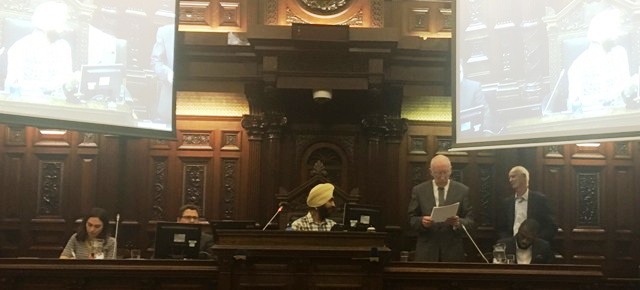 Jaspreet Singh chaired the debate. Professor of Democracy, Nicholas Cheeseman and Alana Tomlin argued for the motion and Keith Stokes Smith and Darrel Blake opposing.
Jaspreet Singh chaired the debate. Professor of Democracy, Nicholas Cheeseman and Alana Tomlin argued for the motion and Keith Stokes Smith and Darrel Blake opposing.
Introduction: In January 2018, we were invited to propose the following motion in the first of a series of debates organised by the Round Table: ‘This House believes that the Commonwealth prevents the UK from moving on from the past and dealing with the future’. The debate took place in Birmingham, and could not have been timelier given the recent announcement that the UK’s second city will host to the 2022 Commonwealth Games. Proposing a motion criticising the Commonwealth was an interesting role to play. We both recognise that the organisation brings a number of positive benefits that are appreciated by the governments of its member states, but the task of setting up the debate required us to look for the negatives; and when we started looking, we were worried to find a number of areas in which the Commonwealth is in need of serious reform. Significantly, these include some of the Commonwealth’s most important claims to contemporary relevance: democracy, human rights, and prosperity.
[Below is an excerpt from the article which appears in the latest edition of The Round Table: The Commonwealth Journal of International Affairs.]
Prosperity
The economic status of the Commonwealth is also problematic. The notion that the Commonwealth can in some sense replace the EU as the UK’s main trading zone does not fit with reality. Today, the Commonwealth represents a very small slice of UK trade. According to the Office for National Statistics, just 9% of UK exports went to Commonwealth states in 2015 compared with 44% that went to the EU. Less parochially, the limited size of the Commonwealth means that it is not feasible to see it as a rival economic bloc with the capacity to protect its members’ interests vis-à-vis the economic might of China and the United States. It is also somewhat ironic that some pro-Brexit figures have identified the Commonwealth as a possible substitute for the EU, given that the UK must pay into the Commonwealth to sustain it and is the largest contributor to the Secretariat, providing £15.4 million (a third of the total running costs) in core funding in 2015 alone.
Moreover, this is not really sufficient for the Commonwealth to function as a meaningful organisation, which is one reason why it has made limited progress to achieving many of its stated goals. Generating a more effective body would require significantly more funding, increasing the bill substantially.
Time to Change
The limitations of the Commonwealth demonstrate that it needs to be reformed if it is to be politically and economically relevant in the future. It is clear that it remains a club that a lot of individuals and quite a few countries want to be a part of, and this foundation can be built upon. Many countries are currently on a waiting list to join as members, which gives the Commonwealth an opportunity to expand its operations. Doing this by actively pursuing democratic states with larger economies would be one way to strengthen the organisation while enhancing its political reputation.
This kind of reform will, however, mean little if the Commonwealth is not also willing to transform the way that it works. Many of those who attended our debate in Birmingham were happy with the organisation, but some of the young political activists we have met while conducting fieldwork in more authoritarian states have asked us why the Commonwealth confers legitimacy on leaders who – in their eyes – have lied and stole their way in to office, and why an organisation that likes to speak about democracy is led by an unelected head of state. Unless progress can be made on these fronts, the Commonwealth risks being seen as an unnecessary anachronism by precisely those people whose hearts and minds it needs to capture.
The authors are based at the University of Birmingham. You can read reports and see videos from the Round Table 2018 student debates on our website.



